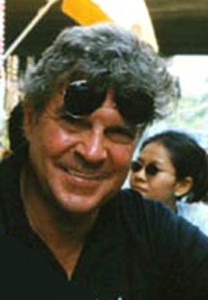
Peter Montalbano is an American Bangkok-based writer, musician and linguist, member of the Bangkok Writers’ Guild. In this interview, Peter talks about writing and his novel project, The Lover with a Thousand Faces.
Mihnea Voicu Simandan: At the Bangkok Writers’ Guild December meeting, we have critiqued a fragment from your future book, The Lover with a Thousand Faces. Can you give us some background on the story?
Peter Montalbano: The story takes place in rural southern Thailand in the aftermath of the 2004 tsunami, when money and volunteers are pouring in by the busload. I was one of the thousand faces in that chaotic scene. If there is a primary theme in the book, it will be the unintended consequences of good intentions.
MVS: Who is the lover with a thousand faces?
PM: It took me awhile to come up with a title at all, then suddenly this popped into my head. At some point in the book, probably towards the end, I’ll elaborate on it, hopefully at a time when the reader will be able to connect the pieces with a sort of “aha” experience, so I don’t want to give too much away, but briefly put, the lover could be either any one of the thousand, or countless, people who come to Thailand and fall in love with the place, or Thailand itself, which shows its thousand faces of love to those who come here. Where there is love, there’s a lot of joy, but—and Buddhism is rightly quite clear on this—where there is love, there is also heartbreak.
MVS: What does the title symbolize?
PM: Also, of course, the title can be seen as a takeoff on Joseph Campbell’s masterwork The Hero With A Thousand Faces. It remains for me to ensure the takeoff is not a cheap one. My literary background is in comparative literature, and Campbell, as well as your compatriot, Mircea Eliade (Myth Of the Eternal Return, whose concepts also hopefully are in play here), influenced my thinking a long time ago. If I can make the title stand on its own, I’ll be proud.
MVS: Tell us about your writing routine.
PM: That’s a good one. Even though in my life I’ve somehow managed to accomplish a few things—only a few—which require discipline, discipline comes extremely hard to me. I find that for me, obsession works better. At least, it’s more fun! I did a couple of literary translations of Thai short stories, which I found it very to tear myself away from. I was working a corporate job at the time, and spent many hours there in the office secretly working on these translations, for which I could have gotten disciplined, or even fired. Then I’d go home and work more, till late at night. I loved what I was doing, so I just couldn’t stop.
MVS: Do you have a writing schedule, or do you write whenever the inspiration comes upon you?
PM: For about a year and a half now I’ve been trying to get to the same point with this novel, so I’ve worked in spurts, no definite schedule, waiting for the spirit to grab me. But creating a novel is different from working with an already finished product, and so far I haven’t managed to either develop a set schedule or become obsessed. Joining the Bangkok Writers’ Guild has given me a nice kick in the pants, so right now I am starting a new regime, writing for two hours a day, hoping for three, starting at ten in the morning. I’ll tell you in a few weeks how it’s going!
MVS: How far are you in the book?
PM: I’ve got something close to ten thousand words down on paper, but I don’t know how many of those will remain in the book. I have done a lot of research, gone back to the tsunami-stricken areas years later, done a lot of interviews, and have read research papers (have a lot yet to read), and have a number of friends, local and farang, who are still down there and are great resources. I have created—in depth, with individual histories—characters that I think will be believable and shed light on the world I’m trying to bring to life, and a story line that should be interesting. I’ve drawn diagrams of the relationships between people, using the actions that bring them together or split them apart. Right now I think I need to revise and expand these diagrams, as well as my story line.
MVS: That sounds like a good plan!
PM: “Bottom line,” I guess I’ve got a good start, but haven’t really gotten very far with the actual writing work. I’m hoping that if I kick-start it with this three hours per day, maybe it will turn into the obsession I’m still looking for. If not, then at least I’ll be moving on steadily, which is what they tell me you have to do.
(to be continued)

